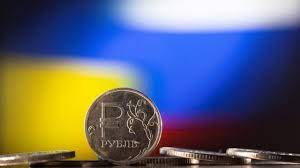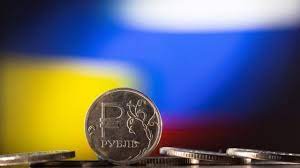
Despite the fact that Russia has spent the previous seven years reinforcing its financial defences, its economy is unlikely to be able to withstand the Western sanctions in the long run.
Following President Vladimir Putin's decision to recognise the independence of two Ukrainian regions, Europe and the United States have retaliated by sending tanks into Ukraine, intensifying sanctions already in place.
"The view Russia will be unaffected is wrong. The negative effects may not be felt upfront but sanctions will hobble Russia's potential in the longer run," said Christopher Granville, managing director at consultancy TS Lombard and a veteran Russia watcher.
The West has imposed sanctions and asset freezes on additional Russian banks and individuals, as well as a halt to fundraising abroad, the delaying of a $11 billion gas pipeline project to Germany, and limits on access to high-tech items including as semiconductors.
Russia has mocked sanctions, stating that they injure those who implement them. They won't affect an economy that now has $643 billion in cash reserves and surging oil and gas profits.
Russia has gained the reputation of "fortress" economy thanks to a current account surplus of 5 per cent of yearly GDP and a debt-to-GDP ratio of 20 per cent, both among the lowest in the world. Only half of Russia's obligations are denominated in dollars, down from 80% two decades ago.
These statistics are the result of years of saving after sanctions were imposed in response to Putin's 2014 annexation of Crimea.
Rising oil prices, according to Granville, would present Russia with a windfall of 1.5 trillion roubles ($17.2 billion) in profits taxes on energy businesses this year.
However, as he pointed out, isolationism has a cost: an increasing disconnect from the global economy, markets, and investment.
"Russia will essentially be treated as a hostile state cut off from global flows, investment and other normal economic interactions that build living standards, incomes, productivity and company profitability."
There are already symptoms of a downturn in the economy. According to the World Bank, Russian household incomes are still below 2014 levels, and annual economic production was estimated at $1.66 trillion in 2019, before the Covid-19 outbreak occurred, which was much lower than the $2.2 trillion in 2013.
According to Sergei Guriev, an economics professor at Sciences Po in France and a former top economist at the European Bank for Reconstruction and Development, Russia's nominal per capita GDP, which was double China's in 2013, is now slipping behind.
"In 2013 Russia was a high-income country and was actively negotiating OECD accession. Russia is now back to the middle-income status," he said.
In addition, the number of foreign investors in Russia is decreasing.
According to a JPMorgan client poll, foreign holdings of rouble bonds are at their lowest level in two decades; equity investment has never returned to pre-Crimea levels in absolute terms, according to Copley Fund Research.
On Thursday, investor demand for Russian dollar debt jumped to over 13 percentage points higher than US Treasuries, nearly double the developing markets average.
"Sanctions are going to force Russia to self-finance more and more activity, constraining investment in industry and the military," said Jeffrey Schott, a trade and sanctions expert at the Peterson Institute for International Economics.
More extreme attacks might include terminating Russian access to the international financial system SWIFT and outright forbidding investment in Russia.
Losing SWIFT connectivity would make it more difficult to conduct export and import payments, and it might even prevent bond coupons from being paid, resulting in a technical default. According to JPMorgan, sanctions might reduce GDP growth by up to 3.5 percentage points in the second half of 2022.
According to the bank, limited access to foreign credit leads oil companies to rely on prepayment arrangements, resulting in significantly higher capital expenses.
The degradation of living standards has the potential to exacerbate public discontent, creating a danger to an administration that has already faced occasional protests. It's possible that there will be spillage.
"Autarky is no recipe for progress," analysts at investment bank Berenberg wrote. "Coping with a heavily armed Russia mired in relative economic decline will remain a key challenge for Europe and the United States for the foreseeable future."
(Source:www.reuters.com)
Following President Vladimir Putin's decision to recognise the independence of two Ukrainian regions, Europe and the United States have retaliated by sending tanks into Ukraine, intensifying sanctions already in place.
"The view Russia will be unaffected is wrong. The negative effects may not be felt upfront but sanctions will hobble Russia's potential in the longer run," said Christopher Granville, managing director at consultancy TS Lombard and a veteran Russia watcher.
The West has imposed sanctions and asset freezes on additional Russian banks and individuals, as well as a halt to fundraising abroad, the delaying of a $11 billion gas pipeline project to Germany, and limits on access to high-tech items including as semiconductors.
Russia has mocked sanctions, stating that they injure those who implement them. They won't affect an economy that now has $643 billion in cash reserves and surging oil and gas profits.
Russia has gained the reputation of "fortress" economy thanks to a current account surplus of 5 per cent of yearly GDP and a debt-to-GDP ratio of 20 per cent, both among the lowest in the world. Only half of Russia's obligations are denominated in dollars, down from 80% two decades ago.
These statistics are the result of years of saving after sanctions were imposed in response to Putin's 2014 annexation of Crimea.
Rising oil prices, according to Granville, would present Russia with a windfall of 1.5 trillion roubles ($17.2 billion) in profits taxes on energy businesses this year.
However, as he pointed out, isolationism has a cost: an increasing disconnect from the global economy, markets, and investment.
"Russia will essentially be treated as a hostile state cut off from global flows, investment and other normal economic interactions that build living standards, incomes, productivity and company profitability."
There are already symptoms of a downturn in the economy. According to the World Bank, Russian household incomes are still below 2014 levels, and annual economic production was estimated at $1.66 trillion in 2019, before the Covid-19 outbreak occurred, which was much lower than the $2.2 trillion in 2013.
According to Sergei Guriev, an economics professor at Sciences Po in France and a former top economist at the European Bank for Reconstruction and Development, Russia's nominal per capita GDP, which was double China's in 2013, is now slipping behind.
"In 2013 Russia was a high-income country and was actively negotiating OECD accession. Russia is now back to the middle-income status," he said.
In addition, the number of foreign investors in Russia is decreasing.
According to a JPMorgan client poll, foreign holdings of rouble bonds are at their lowest level in two decades; equity investment has never returned to pre-Crimea levels in absolute terms, according to Copley Fund Research.
On Thursday, investor demand for Russian dollar debt jumped to over 13 percentage points higher than US Treasuries, nearly double the developing markets average.
"Sanctions are going to force Russia to self-finance more and more activity, constraining investment in industry and the military," said Jeffrey Schott, a trade and sanctions expert at the Peterson Institute for International Economics.
More extreme attacks might include terminating Russian access to the international financial system SWIFT and outright forbidding investment in Russia.
Losing SWIFT connectivity would make it more difficult to conduct export and import payments, and it might even prevent bond coupons from being paid, resulting in a technical default. According to JPMorgan, sanctions might reduce GDP growth by up to 3.5 percentage points in the second half of 2022.
According to the bank, limited access to foreign credit leads oil companies to rely on prepayment arrangements, resulting in significantly higher capital expenses.
The degradation of living standards has the potential to exacerbate public discontent, creating a danger to an administration that has already faced occasional protests. It's possible that there will be spillage.
"Autarky is no recipe for progress," analysts at investment bank Berenberg wrote. "Coping with a heavily armed Russia mired in relative economic decline will remain a key challenge for Europe and the United States for the foreseeable future."
(Source:www.reuters.com)





